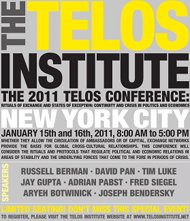By Adrian Pabst · Thursday, March 29, 2012 At the ABC (Australia) Religion & Ethics website, Telos Associate Editor Adrian Pabst recently discussed the crisis of global capitalism, Pope Benedict’s vision of a civil economy, and the possibilities of a Catholic Christian “third way”:
The year 2011 witnessed a new wave of protest movements and unprecedented popular outrage across the globe. From the protests in North Africa and the Middle East to the Occupy Wall Street movement in the United States to the camps outside St Paul’s Cathedral in London and Moscow, demonstrators have expressed a deep-seated anger at global finance that is shared by many.
Continue reading →
By Adrian Pabst · Monday, November 21, 2011 SAVE THE DATE!
The West: Its Legacy and Future
September 7–10, 2012
L’Aquila, Italy
Recent developments appear to end the “end of history” and foreshadow instead the end of the West. After 1989, many expected a gradual convergence toward Western models of liberal market democracy. But Western responses to 9/11 and the 2007–8 transatlantic “credit crunch” have exposed the limits of U.S. international primacy and accelerated the global shift of power from West to East and North to South—as evinced by the rise of China, India, and other emerging markets.
Politically and economically, that shift seems to portend the emergence of a post-American and perhaps even a post-Western world. Yet the United States is still the default superpower whose military might and economic energy ensure its pre-eminence for the foreseeable future. Likewise, Europe’s institutions, culture, and way of life remain attractive across the globe. Even the near meltdown of Wall Street and the mishandling of the sovereign debt crisis have so far not led to a decoupling of the rest from the West.
Continue reading →
By Adrian Pabst · Wednesday, March 9, 2011 This paper was presented at the 2011 Telos Conference, “Rituals of Exchange and States of Exception: Continuity and Crisis in Politics and Economics.”
 For Max Weber, the spirit of capitalism is best understood in terms of Calvinist divine predestination. But by focusing on the Protestant work ethic, Weber’s thesis about the origins of modern capitalism is at once too broad and too narrow. Too narrow because he neglects the counter-Reformation Baroque scholasticism of influential Catholic theologians like Francisco Suárez that sunders “pure nature” from the supernatural and thus divorces man’s natural end from his supernatural finality. As a result, human activity in the economy is separated from divine deification and the market is seen as increasingly autonomous. In short, human contract is severed from divine gift. For Max Weber, the spirit of capitalism is best understood in terms of Calvinist divine predestination. But by focusing on the Protestant work ethic, Weber’s thesis about the origins of modern capitalism is at once too broad and too narrow. Too narrow because he neglects the counter-Reformation Baroque scholasticism of influential Catholic theologians like Francisco Suárez that sunders “pure nature” from the supernatural and thus divorces man’s natural end from his supernatural finality. As a result, human activity in the economy is separated from divine deification and the market is seen as increasingly autonomous. In short, human contract is severed from divine gift.
Continue reading →
By Adrian Pabst · Tuesday, August 17, 2010 The ongoing debate about budget deficits, public debt, and the case for or against austerity reflects old ideological disagreements that ignore the new realities of late-modern capitalism. Both left and right rehash virtually the same arguments since Reagan and Thatcher, but lack the imagination for genuinely fresh ideas and transformative policies.
Continue reading →
By Adrian Pabst · Friday, April 16, 2010  Saturday’s airplane crash killing Poland’s president, Lech Kaczyński, alongside more than ninety other Polish senior civilian (and military) figures happened in Smolensk, near Katyn—the same site where more than 20,000 Polish prisoners of war were murdered by the Soviet secret police NKVD in 1940 on Stalin’s orders, as Victor Zaslavsky’s Class Cleansing: The Massacre at Katyn, published by Telos Press, vividly documents. But last week’s tragedy is no “second Katyn”—contrary to what liberal commentators such as Timothy Garton-Ash would have us believe. Saturday’s airplane crash killing Poland’s president, Lech Kaczyński, alongside more than ninety other Polish senior civilian (and military) figures happened in Smolensk, near Katyn—the same site where more than 20,000 Polish prisoners of war were murdered by the Soviet secret police NKVD in 1940 on Stalin’s orders, as Victor Zaslavsky’s Class Cleansing: The Massacre at Katyn, published by Telos Press, vividly documents. But last week’s tragedy is no “second Katyn”—contrary to what liberal commentators such as Timothy Garton-Ash would have us believe.
Continue reading →
By Adrian Pabst · Wednesday, January 20, 2010 This text was presented in January at the 2010 Telos Conference, “From Lifeworld to Biopolitics: Empire in the Age of Obama.”
Over the past thirty years or so, globalization has supplanted the sovereign national state with the globalized “market-state.” In this complex and non-linear process, the sovereign national state, which provides public investment and universal welfare for the citizenry, has been superseded by the “market-state,” which instead maximizes client and consumer choice by opening up all levels of the economy to global finance and trade, as Philip Bobbitt has documented in his seminal book The Shield of Achilles.[1] Beyond Bobbitt, I have argued elsewhere that the “market-state” fuses centralized bureaucracy with the extension of market exchange to all areas of public policy and the private sphere. In consequence, the institutions of civil society and the practices of civic culture have been largely absorbed into the “market-state” and subordinated to the logic of formal contract and exchange value.[2]
Continue reading →
|
|
 For Max Weber, the spirit of capitalism is best understood in terms of Calvinist divine predestination. But by focusing on the Protestant work ethic, Weber’s thesis about the origins of modern capitalism is at once too broad and too narrow. Too narrow because he neglects the counter-Reformation Baroque scholasticism of influential Catholic theologians like Francisco Suárez that sunders “pure nature” from the supernatural and thus divorces man’s natural end from his supernatural finality. As a result, human activity in the economy is separated from divine deification and the market is seen as increasingly autonomous. In short, human contract is severed from divine gift.
For Max Weber, the spirit of capitalism is best understood in terms of Calvinist divine predestination. But by focusing on the Protestant work ethic, Weber’s thesis about the origins of modern capitalism is at once too broad and too narrow. Too narrow because he neglects the counter-Reformation Baroque scholasticism of influential Catholic theologians like Francisco Suárez that sunders “pure nature” from the supernatural and thus divorces man’s natural end from his supernatural finality. As a result, human activity in the economy is separated from divine deification and the market is seen as increasingly autonomous. In short, human contract is severed from divine gift.  Saturday’s airplane crash killing Poland’s president, Lech Kaczyński, alongside more than ninety other Polish senior civilian (and military) figures happened in Smolensk, near Katyn—the same site where more than 20,000 Polish prisoners of war were murdered by the Soviet secret police NKVD in 1940 on Stalin’s orders, as Victor Zaslavsky’s
Saturday’s airplane crash killing Poland’s president, Lech Kaczyński, alongside more than ninety other Polish senior civilian (and military) figures happened in Smolensk, near Katyn—the same site where more than 20,000 Polish prisoners of war were murdered by the Soviet secret police NKVD in 1940 on Stalin’s orders, as Victor Zaslavsky’s 






